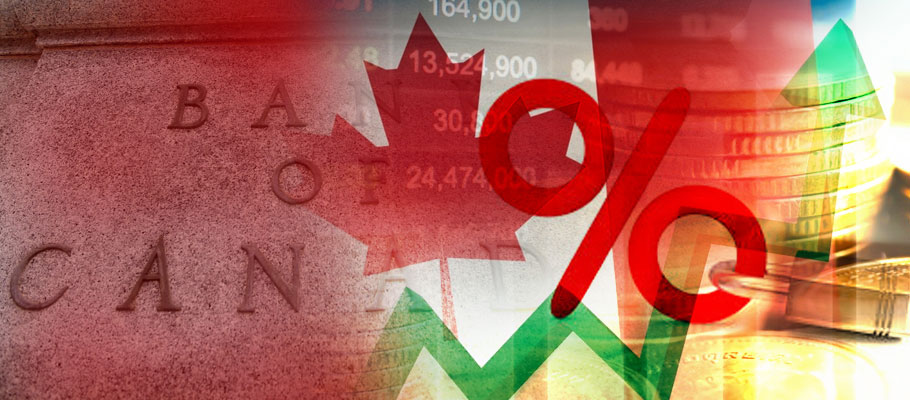
Published: May 28th, 2025
New figures from Statistics Canada show a recent uptick in inflation, suggesting the Bank of Canada (BOC) will not cut rates when it meets in Ottawa next week.
An analysis from CIBC's FX strategy unit notes that a drop in energy prices may have helped cap headline inflation at 1.7% year-on-year, but the BOC's preferred inflation measures actually went up.
Analysts wrote that April's median CPI reading of 3.2% year-on-year puts inflation above the central bank's 1–3 percent threshold. The BOC's April statement highlighted uncertainties related to the ongoing trade dispute with Washington and knock-on effects for the economy and inflation.
With rates currently at 2.75 percent after six cuts totalling 225 basis points, Ottawa central bankers may not want to deliver an overly dovish statement in this cycle. Instead, CIBC believes the bank will emphasize the current risks and uncertainties, which could be supportive for CAD.
Forex traders have decided to bet against the Loonie for now, with futures traders lifting their net-short exposure.Institutions increased gross-short exposure to the Canadian Dollar by a cumulative 33.3 thousand contracts last week, while reducing longs by 2.4 thousand.
Given the strong rally in Canadian dollar prices on Friday, May 23rd, and a weaker Greenback, CIBC says its possible many of thes positions will reverse this week.
A note to investors from Deutsche Bank in January warned the Canadian Dollar (CAD) could find itself testing all-time lows in 1H 2025 if the new Trump administration levied a 25 per cent tariff on Canadian imports.
The election campaign threat made by then-candidate Donald Trump sent CAD ino a spiral. Canadian officials responded angrily, with former Prime Minister Justin Trudeau saying that Canada would respond ‘dollar for dollar’ with retaliatory tariffs of its own.
Deutsche analysts wrote that an escalating US-Canada trade war would be a ‘worst-case scenario’ for Canada's economy and the Loonie.
‘Should American tariffs go ahead, it's natural to assume Ottawa will fight back with tariffs of its own, and in product categories similar to those targeted in the previous 2018 Trump tariff battle. What's different today is that the Canadian government has also mooted the idea of export taxes on commodities. In a trade battle with the US this could give Canada real leverage, despite its much smaller economy.’
If Trump does go ahead with a 25 per cent tariff, Deutsche thinks the impact on Canadian aggregate demand ‘will be significant, probably damaging enough to push Canada into a recession.’
In that scenario the Bank of Canada wold have to respond strongly, forcing central bank policymakers to cut rates more deeply and for longer than previously expected. The result could be a weakened Loonie.
Trump may yet make good on his threat. He repeatedly singles out Canada as a priority target for new tariffs due to what he calls Ottawa's inability to control its southern border and clampdown on illegal fentanyl production.
Canadian households and businesses are still in a period of uncertainty, which could create headwinds that dampen economic growth.
Loonie bulls have been watching nervously since Canada's populist-led conservative party failed to unseat the reigning Liberal Party in the recent Federal Election.
Pierre Poilievre, head of Canada's conservative opposition party, had positioned himself in broad alignment with Trump and the MAGA movement south of the border – not least on the issues of cryptocurrencies. Poilievre even branded himself as the pro-crypto candidate for Prime Minister
‘We need to let ordinary people take back control of their money. To do that in a time of expanding government oversight we need to make crypto fully legal and create conditions that will allow it to thrive,’ Poilievre said in a recent post on X. He pledged to help ordinary Canadians ‘take back control over the money you've earned through your hard work from politicians and bankers.’
He has also said that a vote for him will help make Canada ‘the blockchain capital of North America.’
Poiliviere's crypto plans are light on specifics. Just how he would make Canada a "blockchain capital" remains to be seen. For the time being, his objective is likely to tap the surge of interest in crypto amongst grassroots Conservative Party members. After the ‘Freedom Convoy’ occupation of Ottawa, Canada's capital, by long-haul truckers earlier this year, crypto was seen as a way to get around state surveillance and offer financial support to convoy participants by right wing supporters of the protest.
Poilievre has a long history of criticising Canada's central bank, blaming it for aggravating inflation and debasing the country's fiat currency (CAD), messages that resonate with libertarians and Bitcoin proponents across the conservative base.
The conservative opposition's take on crypto differs sharply from government policy. The Trudeau government took aggressive measures to rein-in the crypto industry in the wake of the 2022 Freedom Convoy protest, adding new reporting requirements for crypto transactions worth more than CAD 1,000.
Exactly how the Conservative party's Bitcoin rhetoric will play out over time remains to be seen. Many will have only learned about crypto because of news around the protest, so may see it as a partisan issue. That would make any pro-crypto message less impactful, especially given that Canadians seem to reject Trump-style populism.
For Poilievre, liberalized crypto policies are hoped to translate into wider political support. For the moment however, a skeptical press and criticism by pundits like Alexander Beck, a senior analyst in Toronto's financial district, are blunting the message.
‘I don't see any evidence that Canadians will be lining up to emulate El Salvador any time soon,’ tweeted Beck, referring to the Central American country's move to make BTC legal tender.